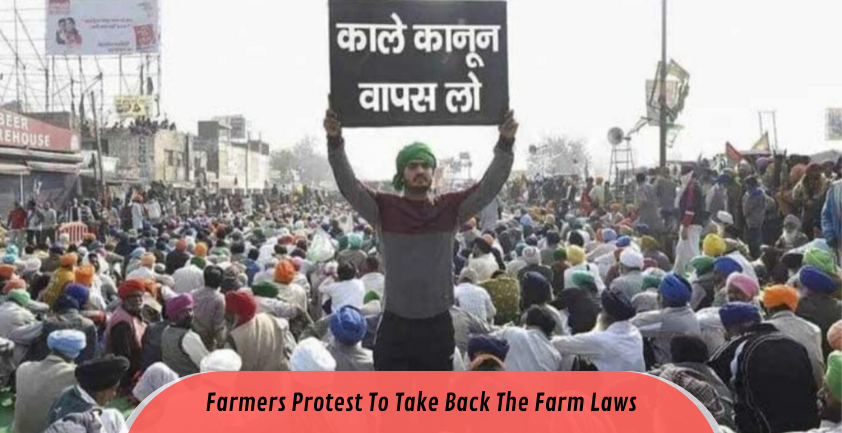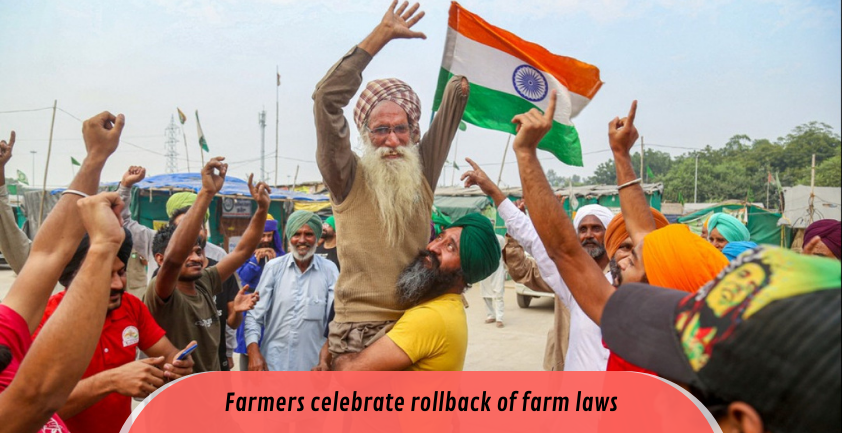WHY DID PRIME MINISTER NARENDRA MODI, REPEAL FARM LAWS?
The farmers’ protest against Indian Agriculture Acts 2020, which were approved in Lok Sabha and Rajya Sabha in September 2017, withstood months of protests before Indian Prime Minister Narendra Modi made a surprise announcement that Government will withdraw the laws. Narendra Modi repeal farm laws. This was a major U-turn by the government for which it had earlier argued that introducing market forces would help fix India’s previous flaws in the agricultural system. Indeed, India’s foregoing system needed to be fixed, but the farmers were apprehensive due to the hurriedness with which the laws were passed, and also they feared that the changes involved would send crop prices plunging.
Background
Since September 2020, the protesters started challenging Prime Minister’s efforts to reshape the farming environment in India.
Farmers stuck to their demands of getting the laws repealed and a guarantee of MSP in writing. The death toll during the protests that started in Punjab crossed 70 and 300 police personnel were injured according to BBC. The remonstrations of 2 months transformed into a Dilli Chalo movement by farmers from Punjab and Haryana. Police barricaded and used tear gas bombs. Camps were built by farmers on national highways stretching the Delhi border and the farmers survived dreadful Delhi winters, pollution, rain, etc.

The farmers declared a tractor rally on Republic Day as a symbol of their distress. On Republic Day 2021, a group of farmers breached security and climbed onto the Fort hoisting their flag alongside the National Flag. One protester died and 80 police officers were hurt. Internet was suspended in various parts of Delhi. Metro stations were closed for security. Even after this, neither the Government nor farmers backed out of their ruling. In the meanwhile, Supreme Court had stayed Farm Laws.
Also Read: What is Farmers Bill 2020| Impact of Farmers Bill 2020?

Arguments of the Farmers
They called for repealing the laws because:
- They believed that the law minimizes the government’s role in agriculture, throwing them open for private investors.
- The farmers in fact believed that the state protection was already insufficient, and the new laws would put them at the mercy of greedy corporations.
- Government support so far guaranteed minimum prices for essential crops. Earlier this had helped remove its hunger crisis in the 1960s.
- In case of any disputes in agreements, farmers will not be in a position to fight cases against big corporates.
Arguments of the Government
- Modi’s government states that laws will modernize Indian agriculture. The laws would liberate farmers and private investment to take the country towards a growth path. As India decides to liberate its economy, the government’s role in the farming sector is not sustainable.
- Farmers will get the freedom to sell their produce anywhere in India even outside the APMC market without any taxes on such trade.
- There will be no restriction on trade outside the state and they can sell their produce wherever they get a higher price.
- There was no need for any license for the purchase of agricultural yield from farmers for transactions outside the APMC Mandis. This encourages trade in agricultural products for the benefit of farmers.
- In cases of disputes in such trades, the matter will be settled by the Sub-Divisional Magistrate in 30 days. For violation of rules and regulations, there will be heavy penalties.
Why PM Modi Decided the Rollback of Farm Laws
Although no official reason was stated why PM Narendra Modi repeal farm laws, the decision comes just ahead of the Winter Session of Parliament. The announcement comes just before the crucial Assembly elections in five states — UP, Punjab, Uttarakhand, Himachal Pradesh, and Goa. It is being speculated that the decision is taken for the electoral gains.
The laws had earlier triggered a year of farmers’ protests, with nationwide demonstrations. This was probably the biggest challenge faced to date by this government. Most influential of the farmers’ bloc and politicians have been up in arms since the laws were introduced. The states due for election have a sizeable farmer population, predominantly in Punjab and UP. In UP also it has shrunk its prospects to form a government for a second term.

The announcement came on Guru Nanak Jayanti, which can be seen as an appeasement to the Sikh community who were a significant segment of protesting farmers.
Implications of Reversal of Farm Laws
As per Narendra Modi Government, the laws were passed for the best interest of farmers, but his government could not satisfy the agitating farmers resulting in to repeal of farm laws. So, what are the economic and political implications of this decision?
- Revoking the farm laws did not go well with many aggrotech companies who wanted to reap the benefits of scale for procurement. They had already entered multiple MOUs with foreign buyers. They may now lose the deals to China, Thailand, and Vietnam. There is a general consensus that reforms are needed in the agricultural sector, some do believe that three farm Acts would have been the right solution and this could be the death of sound agricultural reforms.
- From the framers’ side, the protest would be withdrawn only after the legislation is repealed in Parliament and there is a guarantee on MSP for crops. This demand for MSP is going to be a challenge for the government.
- The government faced protests from the opposition as the Bills were passed and pushed in the legislation in September 2020. They faced protests in Parliament. The Akali Dal was then a partner in the government but it had quit the NDA in consequence of this. And an interesting implication of this revocation is political. A strong possibility of the BJP joining hands with former chief minister Amarinder Singh to win back power in Punjab.
- The unrest within the Punjab Congress could be beneficial to BJP. The party could repair its equation with the Akalis with this. However, the coming days are going to throw light on this. If the Congress in Punjab is defeated, and the party comes to power with the backing of BJP, the retreat will pay off.
- This U-turn could also be targeted at checking the upswing of Rakesh Tikait- the farmers’ leader. The Farmers’ side is asking for the legal guarantee of MSPs for 23 commodities already, and the demand could increase further.
- This run for election win could help the poor in the short run. But the investments, job creation, and growth could slow down. Only time can tell if this is a trade-off between a short-term perk and a long-term loss.
- And for the agricultural sector, it will keep continuing at an agri-GDP growth rate of 3.5% p.a. It has remained the same during seven years of the Modi government and during the Manmohan Singh government. Cropping arrangements will again be in favor of rice and wheat, which has always overloaded the Food Corporation with grains, leading to mismanagement of stocks of grains.
- Since the average holding size of land by the farmers is shrinking, the incomes can only increase from high-value agriculture or the efficient functioning value chains. This will be possible only by bringing in private investments in logistics, storage, processing, e-commerce, and digital technologies.
Wrapping up Thoughts
The agricultural sector needs reforms significantly in terms of inputs, including land lease markets and direct benefit transfer but what is good for a farmer can only be drawn in discussion with the farmer bodies. For now, the narrative on structural reforms is lost and only time alone will tell if the states will act on the much-needed changes to the farm sector.
India’s agriculture crisis is unique and different in each state. This calls for a consultative process, say, experts. The policies should be tuned with the local situation. This is the reason agriculture is a state subject. So, the state governments should formulate policies to their requirements.
Only because the consensus was not reached, the agricultural reforms must not be given up.
Other Popular gd-topics:
- Changing Perspective of Literacy in Current Scenario
- What is Data Privacy and Why Data Privacy is Important?
- High Fuel Prices in India: What are the causes & Impact on the Indian Economy
- Should the Indian Economy be Privatized? Pros & Cons
- Digital Payments in India